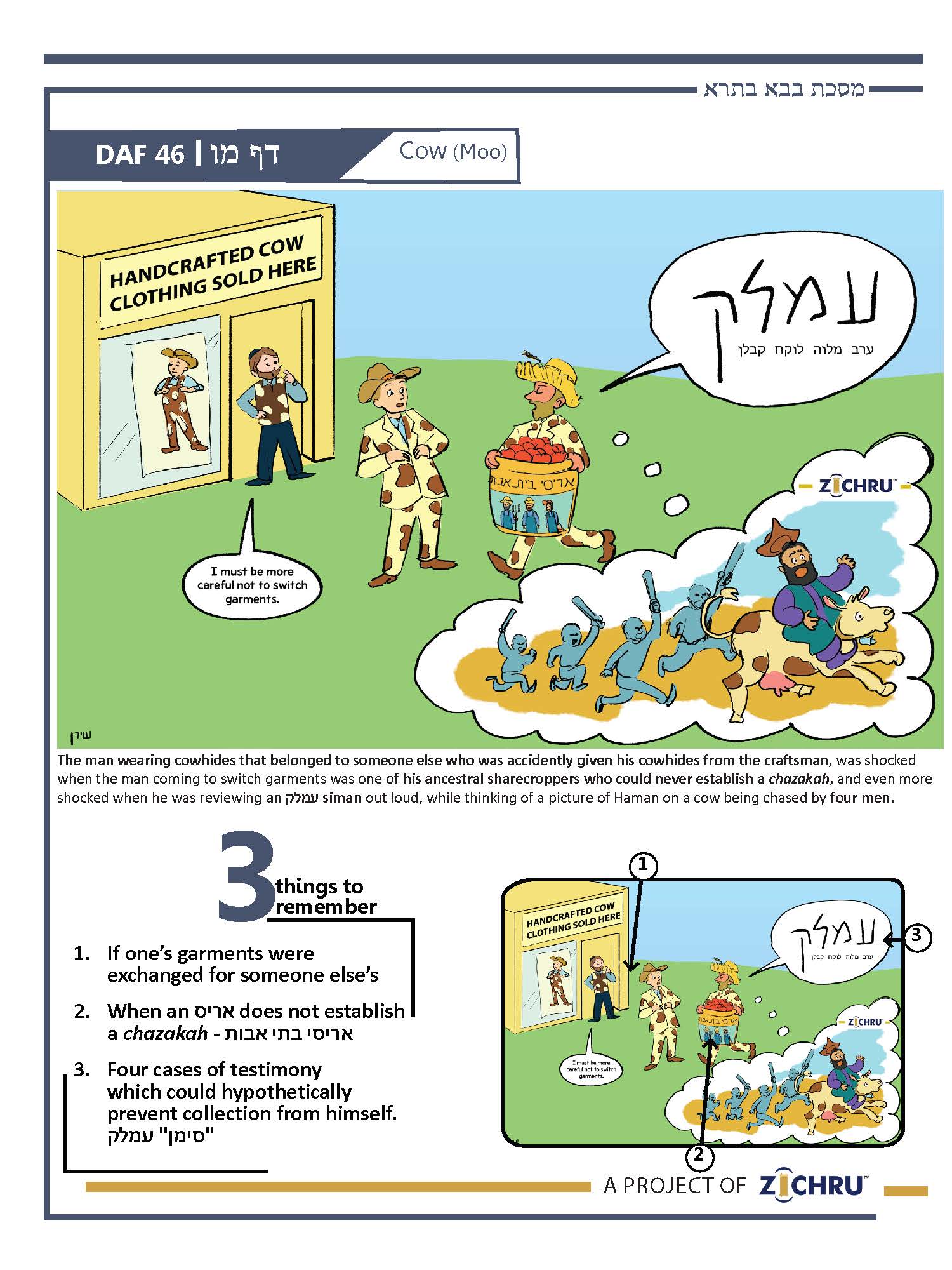Bava Basra - Daf 46
- Audio Timestamps
0:00 - The 3 Sugyos
3:11 - Review of 3 Sugyos
6:16 - Siman
8:48 - 4 Blatt Back Chazarah
17:00 - Pop Quiz (Last 7 blatt)
For access to all Zichru resources including PDFs, and illustrations CLICK HERE
- If one’s garments were exchanged for someone else’s
A Baraisa teaches: נתחלפו לו כלים בכלים בבית האומן – if one’s garments were exchanged with other garments in a craftsman’s shop, הרי זה ישתמש בהן – he may use them, although they are not his, עד שיבא הלה ויטול את שלו – until the other person comes and takes what is his. בבית האבל או בבית המשתה – But if the exchange happened in a mourner’s home, or at a feast, he may not use the garments. Rav reported that his uncle (Rebbe Chiya) explained the difference: וכי אין אדם עשוי לומר לאומן מכור לי טליתי – does a person not occasionally say, “Sell my cloak for me?” Since it is reasonable that the אומן was instructed to repair and sell the garment, we assume he mistakenly gave this person’s cloak for the sale, and when he realized his mistake, intentionally gave the seller’s garment to this person to use until the mistake is corrected. Rav Chiya brei d’Rav Nachman said this only applies if the אומן told him to take "טלית סתם" – “a” cloak, as opposed to "טליתך" – your cloak. Saying “a cloak” indicates awareness that he is giving him someone else’s cloak.
- When an אריס does not establish a chazakah
The Mishnah on Daf 42a taught that an אריס – sharecropper does not establish a chazakah. The Gemara asks why: עד האידנא פלגא והשתא כולה – until today (i.e., three years ago), he only received half the produce as a sharecropper, and now has been taking all of it, which proves he purchased the property!? Rebbe Yochanan answered that the case is באריסי בתי אבות – ancestral sharecroppers, whose families remain אריסין for generations. Such אריסין often alternate taking the entire crop for several years and cannot establish a chazakah. Rav Nachman said: אריס שהוריד אריסין תחתיו – a sharecropper who installed other אריסין in his place, does establish a chazakah after three years, דלא עביד אינש דנחתי אריסי לארעיה ושתיק – because a person would not remain silent when other אריסין, whom he does not trust, are installed in his land without his permission. Still, Rebbe Yochanan said: אריס שחלק לאריסין – a sharecropper who divided some of his labor to other אריסין, but still works there himself, does not establish a chazakah, because it is possible that הרמניא בעלמא שויוה – [the owners] assigned him the authority to bring additional workers to help him, so long as he continues working there.
- ערב מעיד ללוה
A Baraisa lists four cases of testimony which could hypothetically prevent collection from himself. The siman "עמלק" is given for the initials of the four cases: (1) ערב מעיד ללוה – a guarantor of a loan may testify for a borrower that disputed land belongs to him, והוא דאית ליה ארעא אחריתי – provided [the borrower] has other land, because the guarantor will not be collected from, even without testifying. We are not concerned about the possibility of additional debt. (2) מלוה מעיד ללוה – a lender may testify for a borrower about his disputed land, and (3) לוקח ראשון מעיד ללוקח שני – an earlier purchaser of land from a borrower may testify for a later purchaser about his contested land, although the later purchaser’s land protects the earlier purchaser from collection. In these cases as well, the subject of their testimony must have other land available for collection. (4) Regarding a קבלן (a guarantor who is equally responsible for the loan as the borrower, and the lender may collect from either of them), some say he can testify like an ordinary ערב, but others say he cannot: since the lender can choose which land to collect, the קבלן prefers the borrower have more land, increasing the likelihood one of his will be chosen.
Siman – Cow (Moo)
The man wearing cowhides that belonged to someone else who was accidently given his cowhides from the craftsman, was shocked when the man coming to switch garments was one of his ancestral sharecroppers who could never establish a chazakah, and even more shocked when he was reviewing an עמלק siman out loud, while thinking of a picture of Haman on a cow being chased by four men.


